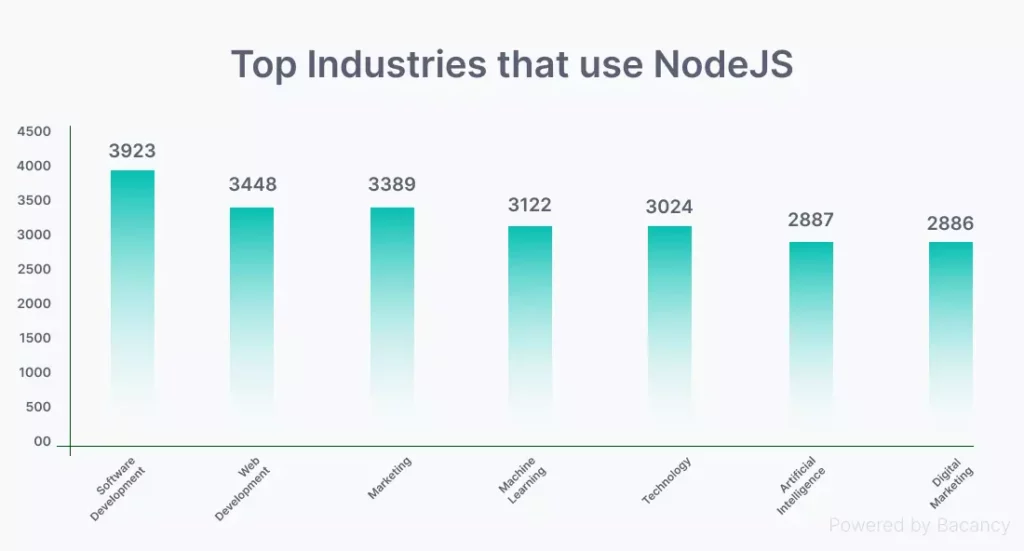The choice of backend technology is a crucial one for every stakeholder involved in an app development project. The total cost, the likelihood of heavy maintenance, and the speed of product delivery to market are all dependent on it.
When it comes to front-end web development and client-side programming, JavaScript has long been a top choice. But it lacked a competitive backend platform, therefore it was never really competitive. Here in this blog, we discuss the advantages and key features of Node.js for backend development.
However, JavaScript has started to make some headway on new platforms and in new domains, with the likes of Node.js and React Native, in the last few years. If you’re seeking to standardise your programming languages, Node.js is your best bet.
Being the first environment to enable JavaScript on both the client- and server-side, Node.js has its own set of benefits that set it apart from other popular JavaScript frameworks.
What Is Node.js and How Does It Work?
Node.js is an open-source, cross-platform, back-end JavaScript runtime environment that runs on the V8 engine and executes JavaScript code outside a web browser.
The primary advantage of Node.js is the speed it provides, which includes rapid data processing and client-server interaction and lightning-fast development. So, Node.js provides client-server connections that are event-driven, allowing for the two endpoints to start interchange and share data.

Because of its one-of-a-kind I/O mechanism, Node.js is exceptional in the kinds of scalable, real-time scenarios that we are increasingly putting our web servers through.
Instead of creating a new thread for each request like other techniques do, Node.js uses a single-threaded event loop with non-blocking I/O calls, which saves RAM while still handling hundreds of connections at once.
Here’s a simplified explanation of its working model:
Event Loop: The central part of Node.js is the event loop. This is where all asynchronous calls are handled. Node.js registers these calls and then continues to execute the script further.
Callback Queue: When an asynchronous operation is completed, the callback associated with that operation is added to the callback queue.
Event Loop Revisit: The event loop revisits the callback queue and executes the callbacks to process the result of asynchronous operations.
Non-Blocking I/O: Input/output operations in Node.js do not block the thread. While the file is being read or the data is being fetched, Node.js can serve another request.
While conventional web-serving approaches use more memory-consuming threads for each new connection, Node.js manages to keep everything operating smoothly with a single thread—as long as the requests aren’t too heavy. This a major factor to consider Node.js for backend operations.
Also, Node.js is efficient, lightweight, and supports front-and back-end development with JavaScript, which opens up new possibilities for developers. Thanks to the front-and back-end flexibility, your development team becomes much more effective and capable of working cross-functionally, which in turn reduces development costs.
Benefits Of Using Node.js For Backend Development
Adopting Node.js as your server technology provides your development team with a significant advantage due to the fact that both the front end and backend are built using the same language. Development expenses will go down as a result of your team’s increased efficiency.
Better Scalability
The ease of scaling the Node.js ecosystem is one of its main advantages. You can add more modules to your system with ease, and it’s already lightweight and fast.
With its simple single-thread event loop and capacity to manage so many concurrent connections, it’s easy to design apps that can scale with your business. An application developed using Node.js may be easily scaled up or down as processing complexity increases. Additionally, you can use Cluster modules to distribute the workload among numerous CPUs.

NPM (Node Package Manager)
With Node Package Manager (NPM), clients have access to a collection of publicly available components that can improve the Node.js user experience and address common and niche concerns. More than a million modules built by external developers are already available.
Clients have easy access to this repository thanks to the NPM CLI tool, which is installed automatically with Node.js. You can also contribute your own module to the NPM if you come up with a very helpful solution to an issue you’ve encountered.
Non-blocking Request Handling
The Node.js framework has a non-blocking IO system that enables the simultaneous processing of many requests. When compared to Python or Ruby, the system’s capacity to manage multiple connections at one go is substantially better.
Modern online applications that do a lot of processing on the client side are well-suited to consider Node.js for backend. Your app will consume less system RAM, scale with ease, and run faster since incoming requests are queued and executed sequentially.
Good For Cross-Platform Development
You’re given a lot more leeway and freedom to do things your way with Node.js. You can build cross-platform apps using Node.js from the ground up, regardless of your operating system preferences—Windows, macOS, or Linux—because the framework is agnostic.
Your developers can collaborate on desktop and web apps with ease, even if they don’t know a lot of other languages. Furthermore, resources like Google Chrome Developer Tools are available to backend developers.
Microservices Architecture
With Node.js’s support for microservice architecture, you can break your project down into its component parts, assign separate teams to work on each part, and update them independently without worrying about breaking the rest of the app.
Additionally, these teams can be decentralised, allowing you to hire the precise team of specialists you require. With each update, only the essential updates are pushed, eliminating the need to initiate a complete reboot.
Use Cases of Node.js For Backend Development
Node.js’s speedy data synchronisation between the client and server, ability to handle numerous client requests at once, and support for sharing and reusing library code packages make it ideal for use in real-time applications.
Real-Time Applications: If you’re building applications that require real-time capabilities such as chat applications, online gaming, or live collaboration tools, Node.js is highly suitable due to its event-driven nature and support for WebSockets.
APIs for Single Page Applications (SPAs): It is a good idea to use Node.js for backend services that serve data to SPAs. It can handle I/O-bound tasks and multiple concurrent requests with ease, which is great for applications where the client-side manages the UI and the server provides a RESTful API.
Scalable Microservices: For applications that need to be broken down into smaller, decoupled services for better scalability and maintainability, Node.js for backend development of microservices is a good choice. Its lightweight nature allows for the creation of microservices that can be scaled independently.

Data Streaming Applications: When your application involves handling streams, like media streaming, processing files during upload, or real-time data processing, Node.js’s stream API can be very beneficial for efficient data handling.
Server-Side Tools and Utilities: Node.js can be used to script server-side tools and utilities due to its fast execution and vast NPM repository, which provides numerous libraries for various utilities, from web scraping to automation.
Conclusion
The demand for efficient, scalable, and reliable web apps is at an all-time high as more and more companies dive headfirst into digital transformation. Whether you’re creating a small business app, an MVP, or an enterprise-level platform, Node.js offers the features and performance you need.
Are you looking to use Node.js’s benefits in your upcoming project?
Take your ideas and turn them into a reality with Appscrip’s product-ready app development options. We provide customised solutions that address your specific business requirements by leveraging our expertise of Node.js and our dedication to development.
Using Node.js, our talented development team builds apps that are rapid, scalable, and up-to-date in line with the requirements of the industry.











